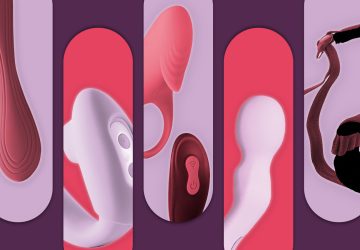Hit Play: Sex Shouldn’t Pause With Menopause
Menopause is a natural phase that every person with a uterus goes through, signaling the end of their reproductive years. During this period a number of physical and emotional changes occur that can affect sexual health and well-being. One of the most significant changes is the decrease in levels of hormones like estrogen and progesterone. We sat down with a menopause specialist and board certified OB/GYN, Dr. Kirstie Cunningham to explore the role changing hormones during menopause can have on sex life and what you can do about it.
The impact of hormonal changes
Estrogen and progesterone are hormones that play a critical role in the reproductive cycle. As you approach menopause, levels of these hormones begin to decline, leading to a range of physical and emotional symptoms including vaginal dryness, reduced blood flow to the vagina, decreased libido, hot flashes, and mood swings.
Dr. Cunningham explains that the most common concerns patients come to her about are ‘libido, hot flashes, brain fog, and low energy. Because at this stage in life a lot of women are at the top of their career, they have to be on their toes all day every day. They can sense the brain fog of perimenopause as they’re processing things slower, and their memory is becoming less reliable. It often gets to the point that it is interfering with their work.
Libido is a big thing because it affects relationships. I have had women come in that are on the verge of divorce because libido combined with mood swings has negatively impacted their relationship. Estrogen levels also change. When estrogen drops the vaginal mucosa becomes dry and sex can be painful. So, some women get stuck in this loop where they worry that sex will be painful. The fear of pain becomes so distracting that sex is difficult to enjoy.
These are all related to hormone changes. After getting care their relationships improve.
When to start asking questions
We frequently hear mixed messages about the difference between perimenopause and post-menopausal life. The average age for menopause in the US is 51. At that time the average person has already been having symptoms for 10 years. In order to prepare for perimenopause or the late reproductive phase of life, Dr. Cunningham believes that women should be asking about menopause in their 30s or earlier. About 1% of women have menopause very early. Dr. Cunningham herself experienced symptoms of menopause in her 20s.
Dr. Cunningham clarified that during perimenopause as testosterone drops libido often starts to decline. But this doesn’t impact everyone. For those that are affected, there is treatment available. Some have found bioidentical hormone therapy useful, along with newer treatments like the O-shot. Dr. Cunningham explains that the O-shot is a treatment for both stress incontinence and orgasm disorder (this ranges from delayed orgasm, muted orgasm, to none at all), whether that is situational or across the board. For example, some women can have an orgasm with masturbation but not vaginal intercourse, which is situational.
The O-shot is made of plasma and platelets. Blood is drawn, spun down, and injected in the interior vaginal wall and the clitoris. It’s administered with a numbing cream so that it’s relatively painless. Even if these treatments don’t call out to you there are some great tips that everyone should keep in mind.
Tips for maintaining sexual health during menopause
- Remember lubricant is your friend: Lubricants can help with vaginal dryness, making sex more comfortable and enjoyable.
- Communication: Talk openly with your partner about any changes you are experiencing and explore new ways to be intimate.
- Practice self-care: Prioritizing self-care is essential for optimal health during menopause, including maintaining a healthy diet and exercise routine, and finding ways to manage stress.
- Educate yourself: Turn to qualified sources like the NIH or CDC for accurate information about menopause. Follow qualified physicians like Dr. Cunningham on social media to start expanding your knowledge.
- Seek specialized support: Remember that you are not alone. Talk to a healthcare provider about any issues you are experiencing as there could be alternative treatments and solutions to assist with your issue. Not all physicians have equal training regarding menopause. NAMS (North American Menopause Society) offers certification for physicians. Go to here to find a menopause specialist in your area.
The hormonal changes that occur during menopause can undoubtedly have an impact on sexual health and well-being. However, there are numerous interventions available to help women maintain their sexual health as they navigate this life stage. With the right mindset and proactive approach, it’s possible to maintain a fulfilling and enjoyable sex life during and after menopause.









